
The Cable Guy features the madcap antics of comedian Jim Carrey, who received a whopping $20 million for his role in this uncharacteristically dark comedy. The story finds a desperately needy soul posing as a cable installer in order to make friends. He then proceeds to stalk them and drive them into personal and professional ruin. His victim this time is played by Matthew Broderick, who makes the mistake of bribing Carrey for a few free movie channels. This starts their “relationship,” which gets more and more bizarre as Broderick (who was living with his girlfriend until he proposed, was refused, and forced to move out) can’t shake the invasive, uncouth, manipulative and generally obnoxious cable guy.
The film offends frequently with a cornucopia of blasphemies, crude sexual references and profanities. There’s some violence as Broderick and Carrey engage in fistfights and medieval combat, and when Carrey severely beats up a man in a bathroom in humiliating fashion. Sexual situations include Broderick being massaged by a woman who, he comes to discover later, was a prostitute hired by Carrey to seduce him (which she does easily). There’s a lot of social drinking, too.
When Broderick tries to get rid of his newfound “friend,” Carrey proceeds to play Broderick like a well-tuned violin, doing whatever he can to make the man’s life a living hell. Getting him arrested for possession of stolen property. Videotaping a private conversation in which Broderick rips on his boss—and playing it on the entire office’s e-mail system. Photographing him with the prostitute and using the Polaroid as blackmail. Carrey even invades the guy’s family and gets them on his side with a game of “Porno Password” (a truly tasteless scene).
It seems Carrey’s character was raised by television. It was a surrogate for absentee parents, including a mother who left him with the “electronic babysitter” while she went out to bars to pick up men (as evidenced in a truly sad flashback in which the young boy pleads for a little brother to play with, but is told to watch TV for company). Carrey’s identities throughout the film change. We never really know his true name. He goes by Chip Douglas, Larry Tate, George Jetson, Ricky Ricardo, Jeann-Luc Picard, Darrin Stevens and a host of other characters he watched on TV growing up. Between the things Carrey says and does, there is a flood of cultural entertainment references (some more subtle than others) that indicate he is a product of the entertainment media: Silence of the Lambs, Batman, Star Trek, Midnight Express, Friday the 13th, Field of Dreams, Mod Squad, Sleepless in Seattle and on and on and on. During a chase scene, he quips, “You know, the trouble with real life is there’s no danger music.” He is an example (admittedly, an extreme one) of the power of media to shape the way people look at reality.
Carrey eventually has a psychological breakdown. He screams to the sky and addresses the mother who deserted him, “You expected Mike and Carol Brady to raise me. I’m the bastard son of Claire Huxtable. I’m the lost Cunningham. I learned the facts of life from watching the Facts of Life!” And, quite cryptically, he utters what he believes to be his last words before diving onto a monstrous satellite dish, “Somebody has to kill the babysitter.” Interesting. The guy spends his time hooking people up to free cable, but finally chooses to eliminate the signal for the good of the many children he realizes could grow up to be as tortured as himself. When he lands on the transmitting device (he doesn’t die), the entire city loses signal just as a verdict comparable to the O.J. Simpson trial is about to be handed down. Crestfallen, the people must cope without their electronic companion, and one man picks up a book as if it were a foreign object fallen from space. He begins reading and a smile crosses his face. This message about how TV has become a substitute for many other pursuits—including true friendships—is worthwhile. I only hope it causes those who sit through the rest of the film (with all of its negative elements) to reconsider the role of media in their lives. But by no means should families hook up with The Cable Guy.
